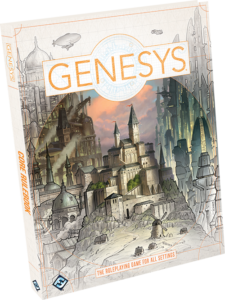
I recentlyu got a chance to talk with Sam Stewart about Fantasy Flight Games upcoming RPG, Genesys, which uses their Narrative Dice System.
 Wayne Basta: First, for our readers who don’t know, please tell us a little about your role at FFG and for Genesys specifically.
Wayne Basta: First, for our readers who don’t know, please tell us a little about your role at FFG and for Genesys specifically.
Sam Stewart: I’m the RPG Department manager here at Fantasy Flight Games. However, I still spend a fair amount of time designing and producing products. For the last year, I’ve been the lead developer for Genesys.
Second, two big questions I suspect I know the answer too but know everyone wants me to ask; what types of other books for the system does FFG have planned and will there be a PDF?
Unfortunately, I can’t go into anything we haven’t announced yet. But be sure to watch our website for news and announcements!
Where did the idea for turning the narrative dice system into a generic system originate?
The idea came about after we’d started seeing people using the Narrative Dice System to run their own games in their own settings. It all came to a head after I’d gone to a convention–Gamer Nation Con–and saw someone running a pretty elaborate hack of the system. Afterwards, I had a long conversation with one of the organizers, who suggested that a lot of people might be looking for one or two roleplaying game systems that they enjoy, and instead of trying new systems, they would rather try exploring new settings.
When I got home, I started writing up the pitch. A few months later, we started working on Genesys.
 I can say I’ve personally seen some good hacks to it at Gamer Nation Con. What were some of the challenges your team faced and what compromises had to be made to create/adapt this system to work with many different potential settings?
I can say I’ve personally seen some good hacks to it at Gamer Nation Con. What were some of the challenges your team faced and what compromises had to be made to create/adapt this system to work with many different potential settings?
We ended up having to make less compromises than you would think. The system proved impressively flexible; a shield in a fantasy setting and a plasma rifle in a space opera setting both felt appropriate, even though they pulled from the same basic ruleset. We ended up having to modify the list of skills and talents, and create a more flexible skill and talent list that changes depending on the setting. But most of the skills and talents that we used in Genesys worked really well in most of the settings.
The biggest challenges involved getting everything we wanted to fit into a single book, which is the biggest challenge we usually face with RPGs! There’s never enough room to publish everything we want to.
What were some of the largest changes you made from the Star Wars RPG, which also uses your Narrative Dice System?
Genesys is its own, stand-alone game that runs on the mechanics of our Narrative Dice System. Because the game is an independent game, it’s given us a chance to update and improve some of the Narrative Dice System’s mechanics. I can’t tell you everything that changed, because we’d prefer to keep some things a surprise for now. But, for one example, defense has been revamped so that it is a lot simpler to understand and implement in the game. Ideally, there shouldn’t be any arguments about what adds to defense, and what sets your base defense.
Motivations are another thing we’ve expanded on. The new system has a lot of depth to it, and some additional choices for the players. We think it does a lot to define characters, and interacts with the game mechanically in some interesting ways.
What were you able to take from your experience working on previous games and apply to making this new narrative system from scratch?
Whenever we work on a new project, we use and build on our previous experiences, and Genesys was no exception. Our department has the benefit of years of experience working on a number of different game lines based in a number of different settings, after all.
In Genesys, one of the things we strove for was simplicity and ease of understanding. We wanted to take a more relaxed, conversational approach with this game and how we presented the rules. We also took the time to simplify and streamline a lot of rules so that they would work better across multiple settings. When you read the book, we want it to seem like you’re having a conversation with us about the game, instead of reading a textbook.
The announcement article mentions multiple settings to build your game from. Can you elaborate on what a setting consists of versus what is part of the core game framework? I.e., are skills/careers/classes/whatever unique to each setting or does each setting use the same pool?
We want people to be able to pick up Genesys, understand the way the game works, and then dive into any setting they fancy without having to learn a whole new set of skills, talents, or whatnot. So yes, there is a lot of crossover.
For example, obviously, the core game mechanics stay the same throughout. But in addition, we also have a core set of careers, skills, and talents that fit into every setting. There are also some careers, skills, and talents that are setting-specific, so you take that core list and augment it with the setting-specific stuff.
Rules-wise, the real differences between settings lie in your choices of gear and species or archetypes. (Archetypes are what we call the different varieties of humans that you can choose from in settings that don’t have elves or aliens and the like. They work just like species do, however.) Different settings also have different adversaries, as well.
Are the different settings designed to be mix and matched? For example, if you want a modern setting with some magic, could you take gear and talents from Fantasy and Modern settings and use them without any tweaking?
One of the things we emphasize in Genesys is the DIY component of GMing. We want this game to be a foundation and a toolbox, so that you can do exactly the kind of stuff that you’re describing here. And actually, you might find what you’re talking about easier than you think!
You see, part of the book is devoted to teaching GMs how to build their own settings. These include guidelines for building your own adversaries, talents, skills, archetypes, items, and careers. It also includes a bunch of alternate rulesets that aren’t integral to the core game, but could be used in multiple different settings. So you can pick up these rulesets and add them to your game with minimal effort.

Can you expand a little bit about what tools the book provides to GM’s looking to create their own settings?
There’s a part of this game that’s focused on empowering the GM to invent their own stuff for their own game. We spend a lot of time talking about what goes into making a setting, and we provide all those guidelines for GMs who want to design their own skills, careers, talents, items, species…basically all the mechanics that you would need for a setting of your own! My hope is that someone who wants to invent their own setting can take what we provide and run with it.
How does skill/class advancement work? Similar to Star Wars, careers and specializations, or something completely different?
Veteran roleplayers with experience in the Narrative Dice System should find a lot of similarities, but we’ve done some new things with it as well. I can’t say anything more about it at the moment, but stay tuned!
The core book will contain settings for science fiction, fantasy, steampunk, weird world and modern day. I know you can’t talk about future products but what settings do you personally hope to add in the future?
Sorry, that still gets too close to speculating about future products, so I’m afraid I’ll have to stay mum on that question for now.
Any highlights you can share from your playtest sessions? Things that failed miserably or worked in a surprising way?Compared to something with a fixed IP, how does Genesys compare in GM game preparation?
This is probably a question that we can better answer once we’ve revealed a bit more about the game.
Thanks, Sam! Look forward to hearing more from Sam and FFG as Genesys gets closer to release. You can follow the latest news about Genesys on FFG’s website.
